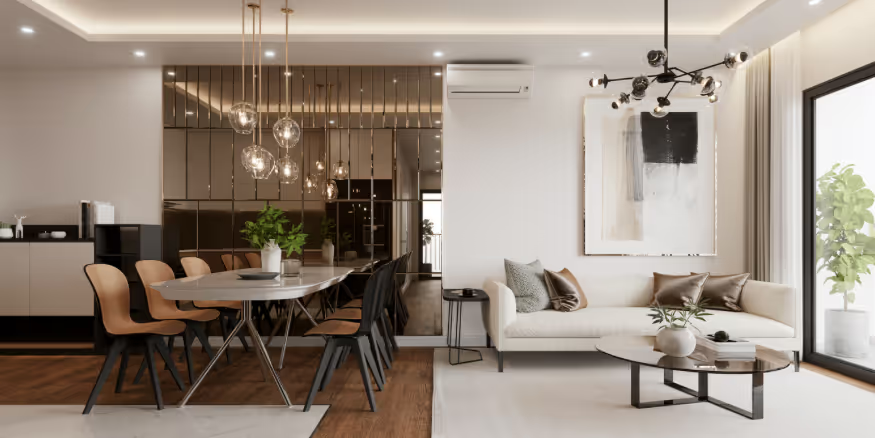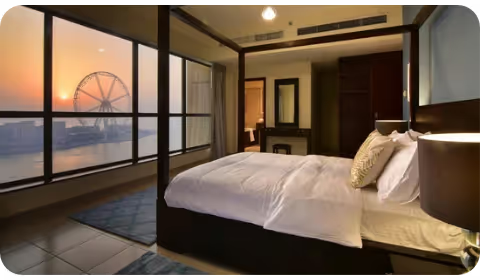If moving to Dubai is on your bucket list for the next year, you’ll naturally start thinking about how much it will all cost you. You will first look into your Visa, then your flight costs, but shortly after, you will need to find a place to live - and this is where it gets tricky. Renting in Dubai can go from 8 to 80, really fast.
On top of your monthly rent, there are a bunch of upfront fees you have to account for. So in this blog post, we’re unveiling all the Housing Fees that come with renting a home in Dubai; so you have a better view of how much it will actually cost you. Oh, and you can check out this Calculator to get a more accurate estimation based on the type of home you want to rent.

Your rental cost will highly depend on the type of accommodation you’re looking for. Generally, there are 3 main options when renting:
It’s important to know that prices can fluctuate greatly depending on the area you choose to live in. Popular areas like JBR or Marina can be double the price than neighbourhoods further in-land like JVC or Al Barsha. Discover the top 10 Areas to live in Dubai in this other article.
Renting prices will also depend on wether you choose to rent short or long term. If you for example choose to rent an apartment for 3 months, the average price per month can be 20%-50% more expensive than renting the same place for 12 months. PRO TIP: Rent for at least 12 months for the best price.
But - In addition to your standard cost of rent, you will have to take into account a number of housing fees when renting accommodation in Dubai. Below are all the additional costs you need to account for when renting your own home in the city.
Most people make the mistake of thinking they only need to account for the first month of rent when moving to Dubai, but that’s not the case. You need to account for security deposits, real agency fees, utilities set up costs, municipality fees, and more!
In addition, you have to also be prepared to pay a few months of rent upfront. It’s not uncommon for Agents and Landlords to ask you to pay 12 months of rent upfront. Yes, you read that right, in Dubai it’s common for tenants to pay with bank cheques, and those can be for 3, 6 or even 12 months - So keep that in mind!!

Collecting a security deposit is a common practice for landlords all around the world. A deposit is a refundable Fee, held by your Landlord or Agent during your stay. The amount will be fully returned if at the end of your contract you have all your bills paid for and the house is undamaged.
A security deposit is normally the equivalent of 5% of annual rent if the property is unfurnished, or 10% if the property is furnished. note that this can vary depending on the location, annual rent price and landlord’s preferences.
The standard commission charged by Dubai’s agents is 5% of annual rent. This is the fee that needs to be paid by the new tenant. If you used a real estate agent to find the home, you should NOT pay an additional fee, as they will split the 5% commission with the listing agent.
This fee is to be paid at the time of contract signing or move in date. If the 5% is less than AED 5,000 they may ask for a flat fee of AED 5,000 instead.
DEWA, which stands for Dubai Electricity and Water Authority, will require you to pay some upfront, as well as monthly fees.
When you move in, you will be asked to pay for a DEWA deposit of AED 2,000 if you are moving into an apartment, or AED 4,000 if you’re moving into a Villa - note these values are subject to change in the future. As other deposits, this is a fully refundable amount when you move out, providing you pay all your outstanding electricity and water bills. In addition to the deposit, you will be subject to “Activation charges”, which are as follows:
For the Tenancy Agreement to be legally binding by law in the UAE, it will have to be registered with the Ejari System - a platform administered by the Dubai Land Department (DLD). The fee can vary depending on where you pay it.
At Trustees Centres, the fees are:
If you register via the mobile App, the fees are:
Most houses in Dubai have a Municipality Fee added to their DEWA bill. If the property you’re renting is part of them, you will have an extra charge of 5% of your annual rent, which is split into 12 equal payments, and added to your monthly DEWA bill.
As Dubai is city where temperatures are high for a big part of the year, all buildings must have a “chiller system” - aka Air Conditioning. So before you move in, you will need to ask if the building includes free AC, or if you have to pay a “contribution” for the building’s costs.
The chiller charges are normally based on consumption (via a meter reading) or based on demand (a set monthly charge which is then reviewed at the end of the year). There is also a fuel surcharge which can be applied to account for increases in fuel prices, and lastly, district cooling deposits and connection fees, which may be applied.
But every building manages this differently so make sure to ask when you’re viewing a property.

.png)